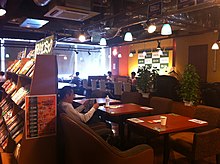Manga cafe
This article needs additional citations for verification. (March 2009) |


A manga café (漫画喫茶, マンガ喫茶, mangakissa, "kissa" being short for "kissaten" which means café or cafeteria) is a kind of café in Japan where people can read manga. People pay for the time they stay in the café. Most manga cafés also offer internet access like internet cafés (ネットカフェ, netto kafe) and vice versa, making the two terms mostly interchangeable in Japan. (One large chain, Popeye, uses the term "media cafe"). Additional services include video games, television, snack/beverage vending machine, and more. Like Japanese cafés in general, smoking is usually permitted.
For an hour's stay, the cost is generally about 400 yen, with most places requiring customers to pay this as a minimum even if leaving earlier. Some manga cafés offer a service where one can stay for the night.
More recently, the concept of manga cafes has also popped up in Europe.
Services
Search criteria at a search engine site ("National Net Café / Mangakisa Search Engine (beta)"[1]) offers a glimpse of services that may be offered at a mangakisa:
- Seating: reading seat, non-smoking seat, sofa, massage chair, party room, internet seat, pair seat, zashiki (tatami matted), reclining seat
- PC: disc burners, office software, color printers, photocopier, TV
- Facilities: movies/DVDs, shower room, darts, magazines, PC class, music CDs, nail salon, pool table, newspapers, CATV/CS broadcast, table tennis, slot machine, tanning bed, mahjong
Criticisms
Recently, there have been complaints from manga publishing/distribution companies that say manga cafés are unfair. Generally, royalties are not paid for the reading of a book and, due to the nature of the business, a single manga or graphic novel can be read by as many as 100 people. The profits go directly to the proprietors of the cafe rather than the manga distributors themselves. (Public libraries avoid this criticism because they do not take profits.) Cafés, such as GeraGera, are competing with companies, such as Kinko's, for quick e-mail and internet service.
See also
References
- Macias, Patick and Machiyama, Tomohiro. Cruising the Anime City: An Otaku Guide to Neo-Tokyo, Stone Bridge Press, 2004. ISBN 1-880656-88-4
